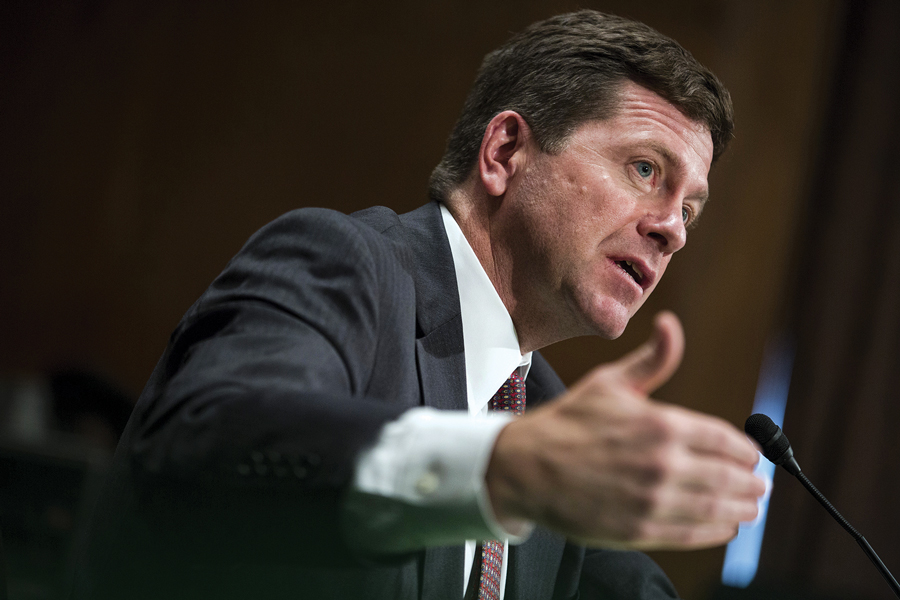

Securities and Exchange Commission Chairman Jay Clayton led the agency to approval of dozens of regulations over his 3½-year tenure — including a new investment advice standard for brokers — but critics say the productivity was tainted by partisanship.
The SEC announced Monday Clayton will step down at the end of the year. He will be permanently replaced by a chairman chosen by President-elect Joe Biden, and the commission will have a 3-2 Democratic majority during the Biden administration.
From the beginning of next year until the Senate confirms a new chair, the agency likely will be run by an acting chair and consist of two Republican and two Democratic members.
As he heads for the door, the SEC said in a statement that Clayton presided over a record number of final rulemakings — 65 — since he took over the agency in May 2017. The highest-profile measure was Regulation Best Interest, which replaced suitability as the broker advice standard and prohibits them from pursuing their own financial gains ahead of their clients’ returns. Reg BI, as it’s known, and a related disclosure document known as Form CRS were implemented on June 30.
In recent weeks, Clayton also has advanced rules that reform private securities offerings and set new requirements for the use of derivatives in investment funds. Last fall, the SEC approved a rule that makes it easier to launch so-called plain-vanilla exchange-traded funds.
“Overall, Chairman Clayton will be considered a well-respected, productive chair,” said James Lundy, a partner at Faegre Drinker Biddle & Reath.
Kurt Wolfe, a securities compliance attorney at Troutman Pepper, also said Clayton leaves with a reputation for getting things done.
“He’s been an effective chairman in many respects,” Wolfe said. “He shepherded through a large number of new rules and amendments. Not everyone likes all of them, and that cuts both ways. Nobody got everything they wanted.”
But an investor advocate said Clayton’s productivity was based on partisanship. Many of the regulations he pushed through — including Reg BI and private market reform — came on split commission votes and were promulgated despite strong dissent from the Democratic commissioners.
“He came in with a reputation as a nonideological dealmaker and leaves as the most partisan and deregulatory chair in recent memory,” said Barbara Roper, director of investor protection at the Consumer Federation of America.
Past SEC chairs have been reluctant to take votes with one or both of the minority-party members dissenting, but not Clayton, Roper said. “He chose to pursue a partisan agenda when there was not a congressional mandate to act,” she said. “That is unprecedented.”
Former Democratic SEC members Robert Jackson Jr. and Kara Stein as well as current Democratic commissioner Allison Herren Lee and investor advocates have criticized Reg BI for being too weak to curb broker conflicts of interest. They assert it does not provide the same level of protection as the fiduciary duty that will continue to govern investment advisers.
“Its only support comes from the [financial] industry and anti-regulatory ideologues that sought the weakest rules,” Roper said. “No group with any claim to speak for retail investors views this as a win for Mr. and Ms. 401(k)."
Clayton has defended Reg BI, asserting it is significantly stronger than suitability and provides investors with a similar level of protection from conflicts whether they’re working with brokers or advisers.
Brokerage firms contend Reg BI has teeth. They say it requires more disclosure and new policies and procedures to identify and mitigate conflicts. Clayton’s successor will wield Reg BI rather than undo it, Lundy said.
“With a Democratic-appointed chair, they’re going to use Reg BI as a powerful tool in their examination and enforcement arsenal,” said Lundy, a former senior trial counsel in the SEC Division of Enforcement. “Reg BI is an important part of Clayton’s legacy.”
The SEC also touted enforcement achievements under Clayton. The agency obtained monetary remedies of more than $14 billion, including a record $4.68 billion in fiscal year 2020, and returned approximately $3.5 billion to harmed investors, according to a press release.
The examination program also was active under Clayton, the agency said, conducing a record number of investment adviser exams in fiscal year 2018. Clayton’s enforcement approach has followed his theme of looking out for Main Street investors, Wolfe said.
The enforcement division “has been bringing cases that are geared toward protecting retail investors,” Wolfe said. “That’s what he said he was going to do, and he has done it. The amount of money returned to harmed investors has been significant.”
The SEC’s initiative addressing inadequate disclosure by investment advisers of the revenue they garner from recommending high-fee mutual funds was a highlight of Clayton-era enforcement. But the financial industry criticized it as regulation by enforcement, meaning the agency didn’t provide rules or guidance establishing its expectations before launching an enforcement crackdown.
“Regulation by enforcement may be here to stay with a Democratic-appointed chair,” Lundy said.

Relationships are key to our business but advisors are often slow to engage in specific activities designed to foster them.

Whichever path you go down, act now while you're still in control.

Pro-bitcoin professionals, however, say the cryptocurrency has ushered in change.

“LPL has evolved significantly over the last decade and still wants to scale up,” says one industry executive.

Survey findings from the Nationwide Retirement Institute offers pearls of planning wisdom from 60- to 65-year-olds, as well as insights into concerns.
Streamline your outreach with Aidentified's AI-driven solutions
This season’s market volatility: Positioning for rate relief, income growth and the AI rebound
